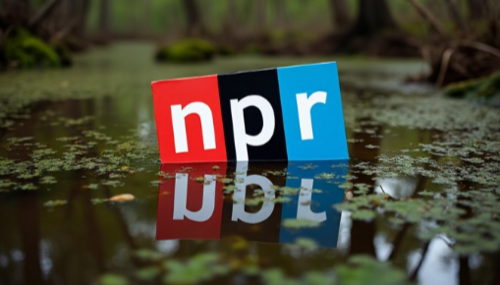A very special episode of Washington Week with The Atlantic aired Friday, devoted entirely to the magazine’s anti-Trump issue, already pushed on the PBS NewsHour. A liberal dream team (nightmare?) of Atlantic magazine staff joined editor Jeffrey Goldberg to take over the taxpayer-supported airwaves fretting over a potential second term for Trump.
He touted their panic-button issue: "We just published a special issue of The Atlantic devoted to answering the question, what will happen if Trump wins? In this issue, 24 of our writers look at Trump's record in domestic and foreign policy, the economy and national security."
He made jokey hints about the dangers of Trump throughout his introduction.
Goldberg: It's an Atlantic takeover! We finally -- we’ve launched a coup! And here we are. So, yes, we have this issue. I hope you at home have a copy of this. You can buy it, find it online, do whatever you want. It’s a free country, we think….
He introduced the panel of Atlantic writers McKay Coppins, Franklin Foer, and Clint Smith, and pictured each of their books on screen, since this is full-blown advertising on public TV. Executive Editor Adrienne LaFrance explained the magazine’s special issue was to people understand how a second Trump term “likely will be different. And the ways in which they're different really lay out the stakes for what that is.”
Goldberg: Is different a euphemism for worse?
LaFrance: I think it is, yes. I mean, worse if you don't like authoritarianism. So, I mean that quite seriously, is when you read this package, you’re left with the really clear sense of, oh, this is what it will be like or could be like to experience the realization of authoritarianism in America. And that that is not something that is just hypothetical, but it's a real danger. I mean, your Editor`s Note in the issue is called a warning, and it really is a warning.
For editors supposedly so worried about dawning "authoritarianism," the mood seemed suspiciously giddy. Perhaps the "warnings" are more about marketing the magazine to liberals than sincere fear?
After the two Atlantic editors insisted this wasn’t about attacking traditional Republican policies (though surely they'll be doing that to, in the name of stopping Trump), LaFrance insisted:
LaFrance: It’s about what America looks like if it is a democracy or if it is under authoritarian rule. And the notion being that we want to remain free and that Trump becoming president again would make that very, very difficult. And so it’s not about right versus left. It’s not about policy, even really at all. It’s about the rise of authoritarianism in America.
Goldberg moved on to the liberal writer Franklin Foer, who made a “Mafia state” comparison. Foer quoted Paul Krugman, usually a bad sign:
Foer: ….He described the first Trump administration as malevolence tempered by incompetence. And so there was a lot of stuff that was happening that was trial and error in that first term where he was testing the limits of what his fellow Republicans would tolerate….
Goldberg asked his executive editor why no one cared about the “amazing reporting” from the mainstream media on Trump and his lying, while accusing Trump's supporters of being not “completely tethered to reality and fact-based discourse.”
Goldberg: How did we get to the place where all of this amazing reporting over the last eight years by The Atlantic, by everyone from The New York Times and the Washington Post, to the networks, CNN, et cetera, how did it come to pass that this reporting, unrefuted reporting, didn’t affect the way millions and millions of people see him, and what does it say about us and what does it say about those people who feel left behind by whatever is going on in this country?
LaFrance lamented the public is tribal: "They have their tribes and places where they can get snap reactions that validate their opinions. We are something not in an environment informationally or culturally making it easy for people to believe truth, despite our best efforts as journalists."
Inside their bubble, these people pretend they're not a "tribe" offering "opinion validation" for the Left. No, they're just the non-ideological "truth."




